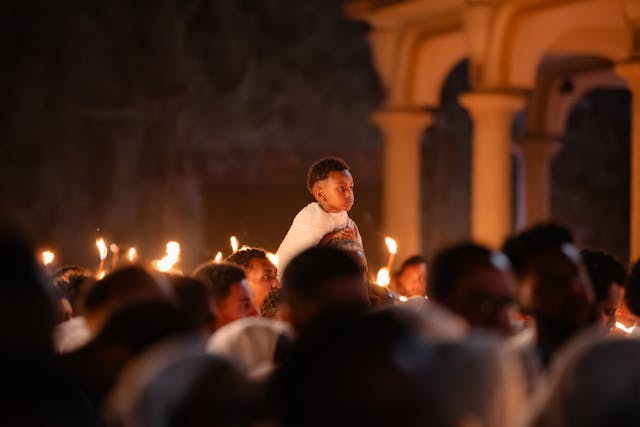Harvey Kwiyani, a Malawian theologian, explores the African Christian New Year's eve tradition of the Watchnight Crossover Service
Introduction
Among African Christians worldwide, no night is more anticipated than New Year’s Eve - widely known as Crossover Night. As the name suggests, it marks the symbolic crossing over from one year into the next. Across the continent and in the diaspora, countless churches hold vibrant Watchnight Crossover Services that draw massive gatherings. In many communities, this night rivals - if not surpasses - Christmas, Easter, and birthdays in significance and excitement. Year after year, millions of African Christians - Pentecostal, Charismatic, Mainline and Catholic alike - usher in the new year with heartfelt prayer, vibrant worship, joyful celebration, and a deep sense of expectant faith. A charismatic prophet in South Africa or Nigeria can easily draw crowds of over 100,000 people to a stadium for a Watchnight Crossover Service. In many other African countries, gatherings of this magnitude are not unusual, reflecting the widespread appeal and spiritual intensity of the occasion.
The function of Watchnight Services
Watchnight Crossover Services serve a profound dual purpose in the spiritual lives of believers. They create sacred space for communities to honour God's faithfulness throughout the passing year while boldly declaring their trust in his continued provision for the year ahead. They involve a great deal of heartfelt gratitude - people come together to acknowledge God's sustaining presence during the twelve months drawing to a close. This thanksgiving runs deeper than mere ritual; it represents a genuine recognition of divine intervention in the ordinary and extraordinary moments of their lives.
These services also embody forward-looking faith - believers express unwavering confidence that the same God, who carried them through past challenges, will remain their source of strength and blessing in whatever lies ahead. The gatherings overflow with powerful testimonies as people recount specific instances of God's faithfulness. They might explain how divine protection shielded them from countless dangers - near-miss accidents on treacherous roads; healing that came when medical options seemed exhausted; and unexpected provision when financial resources ran dry.
The testimonies that fill these watchnight hours paint a vivid picture of lived faith: ‘God's hand pulled me back from the edge of that accident,’ one might declare. Another shares, ‘When the doctors had no more answers, God became my healer.’ Still others proclaim with deep emotion, ‘Just when my child's school fees seemed impossible, God opened a way where there was no way.’ These declarations reveal the heart of African Christian spirituality—a faith rooted in the intimate belief that God actively participates in daily life as healer, protector, and provider. In these sacred hours between years, believers do not simply hope for divine intervention; they celebrate a God they know personally, the One whose faithfulness they've witnessed firsthand and whose continued goodness they anticipate with confident expectation.

Photo by Gift Habeshaw
Establishing a prayerful foundation
In addition to thanking God for the two essential gifts - life and time - which make it possible to cross from one year into the next, participants also seek to establish a solid foundation of prayer for the year ahead. A Watchnight Crossover Service often marks the beginning of an extended season of prayer and fasting - typically 21 or 40 days - during which believers fervently intercede, asking God to thwart every scheme the enemy may have planned for the year. Many are deeply convinced that entering the new year in a spirit of prayer, praise, and thanksgiving is not only the first but also the most important victory of the year - one that sets in motion a series of many breakthroughs to follow. For them, the watchnight is more than a celebration; it is a spiritual reset that sets the tone for the entire year.
At the heart of this practice lies a theological conviction deeply rooted in African culture - a culture so closely intertwined with African religion that the two are virtually inseparable. This belief is shaped by a worldview that understands the cosmos to be home to myriads upon myriads of spirits that profoundly influence all the workings of the material world. For many Africans, there is no division between the spiritual and the physical; the two realms are in constant interaction. Spirits are believed to engage with the human world continuously, shaping events, outcomes, and experiences. Within this spiritual landscape, it is understood that many benevolent spirits exist to support and propel people toward success, victory, and flourishing. At the centre of it all is the belief that true success in any area of life comes only through the help of God - the supreme and all-powerful Spirit. There are also many malevolent spirits whose sole purpose it is to hinder human progress, diminish our well-being, and delay, or even block, our blessings. Of course, many other spirits are neutral and can be used to bless or curse.
Building Holy Spirit capital for the year ahead
Essentially, in the African worldview, thriving in life requires that the benevolent spiritual forces working on one’s behalf outweigh any malevolent powers seeking to obstruct one’s progress. Whether Christian or adherent of traditional religion, many Africans will pray, fast, and offer sacrifices to their deities in order to strengthen the spiritual forces aligned with them. For African Christians, however, there is a distinct conviction: through Jesus Christ, they have access to the ultimate power, the Holy Spirit of God, who surpasses and overrules all other spiritual forces in the universe. Thus, the Watchnight Crossover Services, along with the prayers and fasting that follow, play a vital role in building and aligning a person’s spiritual capital for the year ahead. For many, it is too risky to get into a new year without such capital.

Photo by Edwin Andrade on Unsplash
An invitation to Western Christians
These stories of African prayer practices are not merely exotic or distant cultural expressions to be admired from a safe distance. Instead, they offer a rich invitation to rethink how we approach prayer and spirituality in the West. In a context where faith is often private, individualistic, or compartmentalised, African Christians model a deeply integrated spiritual life - one in which prayer is both communal and constant, and where the spiritual world is taken seriously. Importantly, the African worldview - where the spiritual and material realms are inseparably intertwined - is, in many ways, closer to the worldview of the Bible than that of the modern Western imagination. The Biblical narrative assumes a world alive with spiritual activity: angels, demons, dreams, visions, divine intervention, and persistent prayer. African Christians read and live the Bible from within a similar spiritual framework, offering Western Christians a valuable reminder of the Bible’s own assumptions about how the world works.
Putting a watchnight service into practice
There is much we can learn here: the importance of starting the year with intention and faith; the power of persistent, collective prayer; and the deep conviction that God is actively involved in the everyday details of our lives.
Many of us worship in increasingly multi-cultural churches, and some of your congregation may welcome the opportunity to be part of a New Year’s Eve watchnight prayer meeting. How might the different cultures in your church combine and lead a powerful and spiritually diverse evening of worship, testimony, and prayer for the New Year to come?
If this is a new tradition for your church, you could allow it to be shaped by those from African or Caribbean heritage where a watchnight service is part of their cultural and spiritual practice, while making sure all are welcome and can participate.